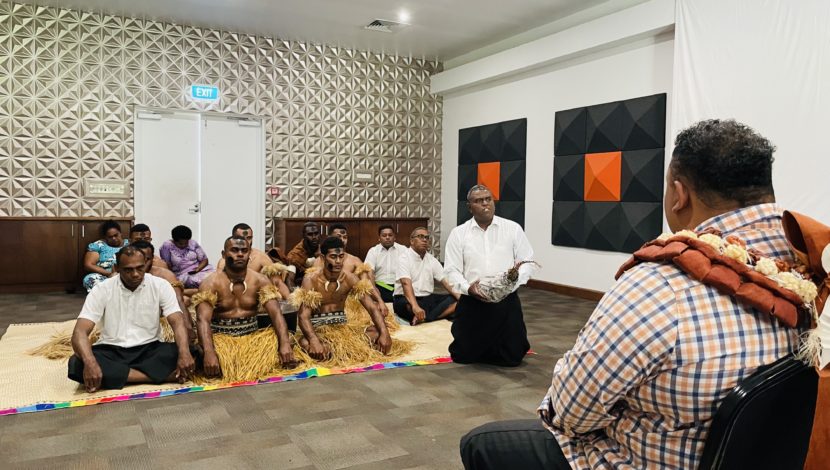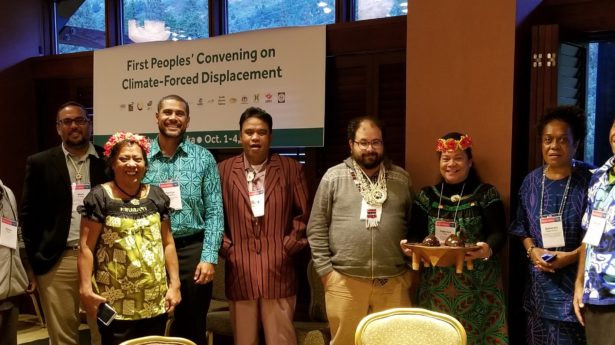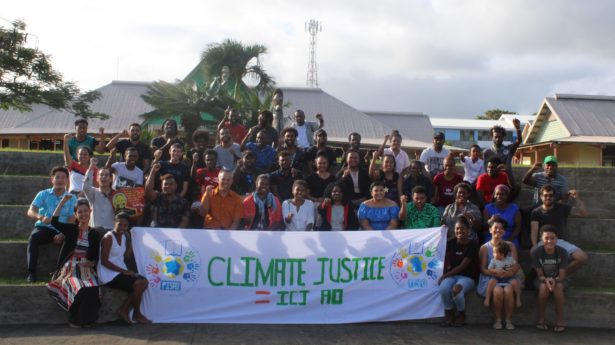The Unitarian Universalist Service Committee advances human rights through grassroots collaborations.
UUSC Supports Pacific Islanders’ Fight for Climate Justice

By on June 9, 2022
UUSC and its three partners—Climate Tok, Pacific Climate Warriors (PCW), and Kioa Island Community Organization (KICO)—are convening during the month of June to discuss the impacts of climate change on Pacific island nations.
Climate change is one of the most important and urgent political, economic, and social issues of our generation. It demands urgent and collective global attention, especially from wealthy countries. Climate change does not affect just one nation—it affects us all. Moreover, the most vulnerable countries are in the Pacific.
Pacific Islanders face the world’s most serious climate impacts as the burning of fossil fuels has contributed to significant sea level rise; global warming presents an existential risk to these island nations. The most substantial forms of climate change include loss of land (subsidence), intense cyclones and droughts, loss of crops and coastal fisheries, coral reef bleaching, and many other environmental threats.
Pacific Islanders were the primary force behind the Paris Agreement, a 2015 international treaty developed to address the rampant effects of climate change around the world. Pacific Island activists have consistently asked for greater representation at international conferences on climate change.
Loss and Damage
Convening in Fiji in early June, Climate Tok invited Salote Soqo, Director of Advocacy, Global Displacement at UUSC, to be the keynote speaker and facilitate discussions on loss and damage, a term coined by the United Nations (UN) to describe the materials costs associated with climate change. According to the London School of Economics, the impacts of loss and damage “…include harm to human health and mobility, loss of access to territory, cultural heritage and traditions and indigenous and local knowledge, and damage to biodiversity and habitats.”
In alignment with its partnership model, UUSC also listened to Climate Tok advocates to learn how its advocacy framework can support the group’s goals. Along with UUSC, Climate Tok brought together 25 Indigenous leaders from around Fiji; all of these activists are experiencing loss and damage.
For the past two years, Climate Tok has worked consistently to support communities all over Fiji. It has been working with Fiji’s 14 provinces to build relationships and consult with impacted communities experiencing climate-forced displacement.
Reconnecting and Strategizing
After the Climate Tok convening, a regional conference was hosted by UUSC and facilitated by UUSC partner Pacific Climate Warriors. The purpose of the conference was to:
- Reconnect leaders and activists;
- Discuss the impacts of the COVID-19 pandemic on Pacific communities;
- Brainstorm joint advocacy priorities; and
- Collaborate on future loss and damage work.
A loss and damage discussion focused on how UUSC partners can utilize a grant from the Climate Justice Resilience Fund (CJRF) to address the real-time impacts of loss and damage on Pacific communities.
Later in June, UUSC will travel to Kioa Island to visit its partner, KICO. This meeting will coincide with the launch of KICO’s new strategic plan.
Kioans are originally from the island of Vaitupu in Tuvalu. Kioa was purchased by a group of Vaitupu islanders after World War II in response to overpopulation. To preserve Vaitupu resources, 37 people migrated to Kioa island and within 10 years more than 200 people followed. Unfortunately, today, Kioa is facing chronic food shortages due to climate change.
Although Kioa is part of Fiji, it has been isolated from Fiji’s political governance. As a result, the island is often overlooked in planning or climate governance efforts. UUSC is the first—and only—funder supporting KICO and its work.
Photo Credit—Michael Kourabas, UUSC

